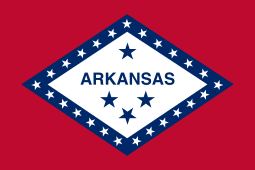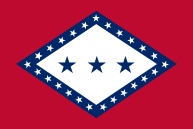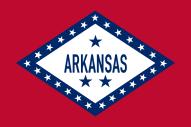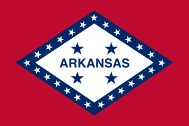Flag of Arkansas facts for kids
The flag of Arkansas, also known as the Arkansas flag, consists of a red field charged with a large blue-bordered white lozenge (or diamond). Twenty-nine five-pointed stars appear on the flag: twenty-five small white stars within the blue border, and four larger blue stars in the white diamond. The inscription "ARKANSAS" appears in blue within the white lozenge, with one star above and three stars below. The star above and the two outer stars below point upwards; the inner star below points downwards. The flag was designed by Willie K. Hocker of Wabbaseka, a member of Pine Bluff Chapter of the Daughters of the American Revolution.
Contents
History
Around 1912, the Pine Bluff Chapter of the DAR wished to present a state flag for the commissioning of the battleship USS Arkansas. When it was discovered that Arkansas did not have a state flag, the DAR chapter decided to sponsor a contest to design a flag. Hocker, a member of the Pine Bluff DAR chapter, won with a design that is similar to the current flag. She designed the flag with three blue stars in the middle of the white diamond and omitted "ARKANSAS". At the request of the flag committee, chaired by Secretary of State Earle Hodges, Hocker added "ARKANSAS" and rearranged the stars to one on top and two on bottom. This flag was adopted by the legislature on February 26, 1913.
In 1923, the legislature added a fourth star, representing the Confederate States of America. This fourth star was originally placed so that there were two stars above the state name and two below; this was to include the Confederacy alongside Spain, France, and the United States. Since this disturbed the other two meanings of the original three stars, the legislature corrected this in 1924 by placing the Confederate star above "ARKANSAS" and the original three stars below it, as it is today. The 1924 design was confirmed as law in 1987 by Act 116, signed by Bill Clinton.
In 2011, Act 1205 (formerly House Bill 1546) was signed by Governor Beebe adding some more details to the state flag. In the terms of colors, the red and blue used on the state flag is Old Glory Red and Old Glory Blue. The Act also stated that flags purchased by the Secretary of State must be manufactured in the United States.
Symbolism
The flag's elements have a complex symbolism. According to the 1987 state law defining the flag, the diamond represents Arkansas' status as "the only diamond-bearing state in the Union". (Crater of Diamonds State Park was the only diamond mine in North America at the time, before more recent discoveries in Colorado and Montana.) The number (25) of white stars around the border of the diamond represents Arkansas' position as the 25th state to join the union. The blue star above "ARKANSAS" represents the Confederate States of America, which Arkansas joined in secession. The design of the border around the white diamond evokes the saltire found on the Confederate battle flag.
The three stars below "ARKANSAS" have three separate meanings:
- The three nations to which Arkansas has belonged (Spain, France, and the U.S.)
- The Louisiana Purchase, which brought Arkansas into the U.S., was signed in 1803.
- Arkansas was the third state (after Louisiana and Missouri) formed from the Louisiana Purchase.
The statute states that the two outer, upward-pointing stars of the three are considered "twin stars" representing the "twin states" of Arkansas and Michigan, which it claims were admitted together on June 15, 1836. However, that part of the statute contains two inaccuracies:
- The three stars were in a single row in Hocker's original design; they were not arranged in a triangle until later. Though one source indicates that the "twin states" symbolism was added by the 1924 Legislature, another states Hocker's "twin stars" are actually two of the 25 stars in the diamond, in the far left and right points; the latter is more consistent with the original design, even though Michigan is actually the 26th state.
- While both states' acts of admission were signed by President Andrew Jackson on that day and Arkansas became a state immediately, Michigan was offered admission only on condition of ceding the Toledo Strip to Ohio in exchange for the Upper Peninsula. Once that happened, it was finally admitted January 26, 1837.
In 2001, a survey conducted by the North American Vexillological Association (NAVA) placed the Arkansas state flag 45th in design quality out of the 72 Canadian provincial, U.S. state, and U.S. territory flags ranked.
Salute
The law defining the flag also defines a text to be used in saluting the flag: "I salute the Arkansas Flag with its diamond and stars. We pledge our loyalty to thee."
Images for kids
-
Original two Arkansas State Flags before being sent to undergo restoration in West Virginia in late 2018.
See also
 In Spanish: Bandera de Arkansas para niños
In Spanish: Bandera de Arkansas para niños






